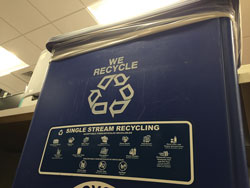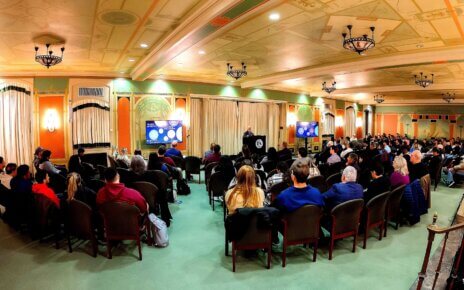The University will be redeveloping its Sustainability Council with faculty and students, and forming a detailed ten-year plan to improve Monmouth University’s green initiatives according to Patricia Swannack, Vice President for Administrative Services.
The Monmouth University Sustainability Council was formed in 2009. It originally was a group of 30 volunteers comprised of students, faculty, staff and administrators whose mission was to promote environmental awareness and encourage development of an environmentally responsible campus community, according to the University website.
However, some students recently noticed that the Sustainability Council was no longer active at the University. “Some peers and I were looking at the Monmouth website online a couple of weeks ago, at the Sustainability Council page, and noticed that the a few members of the faculty listed don’t work here anymore,” said Carly Miller a junior homeland security student. “We were so surprised how outdated our sustainability page was. Especially because it was online for the public to see. The site has since been updated, but the last notable edit on the page prior to the site removal, was around Earth Day 2015,” continued Miller.
In response to student interest, Swannack has agreed to reform the Sustainability Council. Swannack said that before the end of the semester she will be sending an e-mail inviting the University community to attend a round table discussion where interested parties may share goals and potential actions to make Monmouth a front-runner in sustainable practices.
University President Grey Dimenna said, “Universities should be a resource to surrounding communities in terms of education, culture and issues of importance to society. We should lead by example as well sharing our knowledge and education for surrounding communities including taking action to protect our environment.”
“The protection of our environment is a world-wide issue. While students attend Monmouth they are laying the foundation for who they will become as an adult. If the University is green hopefully we can influence students so when they leave they have a sense of the importance of protecting the environment,” Dimenna continued.
Swannack shares those beliefs. As a faculty member of the University since 1975, Swannack said that she has encouraged multiple plans that have simultaneously reduced energy costs and consumption on campus, such as water refill stations, electric car charging stations, a shuttle service, electric carts, and a community garden.
According to Swannack, Monmouth is the first private University in the state to sign a comprehensive green operation agreement with the U.S. Environmental Protection Agency (EPA). As part of the agreement, the University had to align its campus planning efforts with the State Development and Redevelopment Plan and Monmouth County’s Growth Management Guide, as stated in the University website.
Today, members of the University community may notice recyclables and trash being disposed of together. Swannack explained that this is because the University utilizes a single stream recycling system in an effort to recycle in a cost-effective manner. In theory all recyclable items are collected together and then sorted at the landfill.
However, a member of the current inactive sustainably council, who would like to remain anonymous, explained that single stream recycling may be a problematic choice. He/she said that a piece of garbage thrown into the recycling can contaminate the recyclables, and that is why they are then collectively disposed of as garbage.
The same individual also expressed displeasure in the productivity of the failed attempt at the first sustainability council at the University. He/she said that after forming the council a follow-up meeting never happened. It is his/her hope that faculty and students alike develop a council with a checks-and-balances system of both faculty and students, as well as the development of a detailed goal oriented plan so that the sustainability of Monmouth will exponentially advance in the years to come.
All students and faculty are encouraged to email Swannack at pswannac@monmouth.edu if they would like to be a member of the council, or contribute any thoughts on this matter. President Dimenna also expresses openness to students to have discussions about the future of Monmouth’s sustainability.
PHOTO TAKEN by Jamilah McMillan



